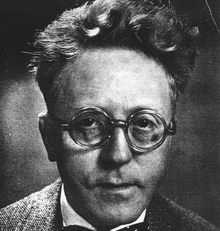- Dent Mowrey
-
Dent Mowrey was a musical prodigy who lived in Oregon from 1916 until his death in 1960. He was born in Ogden, Utah, in 1886, his father a housepainter and his mother a dressmaker. As a child, Mowrey visited Oregon with his mother and fell in love with the state. His talent took him to the prestigious Leipzig Conservatory in Germany. After graduation he studied composition with Claude Debussy and gave recitals in Paris, including at the Sorbonne—a striking achievement for an American musician prior to World War I. Upon returning to the United States in 1916, Mowrey settled in Portland as a young concert pianist, teacher, and composer. His teaching, performances, lectures, and natural charm were highly influential in the Oregon arts scene.
Contents
Mowrey as teacher
In 1928 Mowrey convinced the owner of the new Pacific Building, then the tallest building in Portland, to build a piano studio on the rooftop.
- Students such as Thelma Schnitzer rode the elevator to the roof and took lessons in the glass-walled studio, playing alongside Mowrey on one of two rare 9-foot Chickering grand pianos.
- According to Dolores Hsu, a student in the early 1940s, the acoustics were spectacular, and the music floated out over the rooftop garden that few below knew existed.
- Don Lehmann, a professor of piano at University of Portland until the late 1960s, remembers attending one of the rooftop recitals and being amazed at the level of artistry he heard and saw there.
- Sylvia Davidson, a stringer for The Oregonian and longtime member of the Oregon Symphony Board, remembers Mowrey walking to the Pacific Building each day from his home on SW Douglas Pl. with his long loping strides, and characteristic spectacles and bow-tie.
- An early and influential member of the Oregon Music Teachers Association, Mowrey created music that other teachers valued for developing their students’ technique. At least a dozen of these works were published by G. Schirmer & Co. They became popular across the country and are still used today. Mowrey was also an early member of the Society of Oregon Composers and the Musicians Club of Portland.
Mowrey as performer
Besides giving recitals in Portland for prominent supporters, Mowrey performed in various U.S. cities, earning rave reviews.
- The Seattle Times: a “scintillating genius”
- The Oregonian: “a musical genius”
- The Paris Mail reported, “Mr. Mowrey gave a rare interpretation of Debussy. Small wonder M. Debussy personally congratulated this unusual young artist.”
Orchestras in Tacoma, Boise, Seattle, San Francisco, and Portland played Mowrey’s symphonic works into the 1950s.
Mowrey as composer
Mowrey composed for the piano, vocal ensembles, band, woodwind and string ensembles, and orchestra. The Portland Symphony, later known as the Oregon Symphony, premiered several of his works starting with “The Gargoyles of Notre Dame” in the orchestra’s first national radio broadcast in 1927. The Oregon Journal reported: “The auditorium rang with applause that assumed sensational proportions and resolved into a most unusual demonstration.” Time Magazine related that the symphony’s first professional conductor placed a wreath around Mowrey’s neck to go with a standing ovation. This kind of recognition was spectacular and groundbreaking for an Oregon composer, at a time when European musicians and music were most influential in the U.S.
While living abroad, he journeyed through the North African Sahara with a Beduoin caravan to research the native music there. His “Bedouin Melody” was performed by the Portland Symphony. His Piano Concerto (Africa), which he played with a number of West Coast symphonies, gave his impression of the contrasting civilizations of ancient and modern Africa.
A legacy recovered
After Mowrey’s death in 1960, a report was given to the Oregon Historical Society along with concert programs, recital announcements, and lists of his published and unpublished works. His musical compositions were donated to the Multnomah County library in downtown Portland. Many of the pieces were not catalogued and sat inconspicuously in the library basement until 2009. While researching Portland’s early arts history for an article in The Oregonian in early 2010, reporter John Terry read about Dent Mowrey.
Allan Halbert, a conductor/music director in Oregon, was intrigued with the idea of reviving Mowrey’s music. When asked about the collection, the library decided to designate it as rare book material. The works, mostly manuscripts in Mowrey’s hand and written in pencil, were relocated to the Wilson Room in the library. As rare book material, they could not be checked out or photocopied, and the only option was to photograph them. Halbert photographed nearly one thousand pages of unpublished and unrecorded works and then began the process of restoring the music to a playable condition. This included retracing the notes and other markings with a pencil, creating missing parts, and correcting discrepancies between the scores and parts.
Performances today
Under Halbert’s direction, in June 2010 the Starlight Symphony of Beaverton, Oregon, gave a concert including “The Gargoyles of Notre Dame.” This was the same work premiered by the Portland Symphony in 1927 and not heard in at least half a century—long enough that most Oregonians are unaware of the national recognition Mowrey brought to Oregon. Rehearsing the music was an adventure for the musicians, with no reference recordings, no instructions from the composer, and no easy-to-read commercial music copies.
As talented as he was, he did not seek the limelight and tended to be unassuming and private. In the late 1950s, the home of Mowrey and his wife Eve was broken into, and they were locked in a closet. When they were finally found, the experience left them in a reclusive state, and Mowrey’s heart lasted only a few more years.
External links
- "Portland composer shrouded in history, ready to be revived", January 10, 2010, The Oregonian
Categories:- 1886 births
- 1960 deaths
- Musicians from Oregon
Wikimedia Foundation. 2010.

